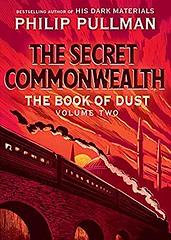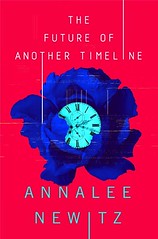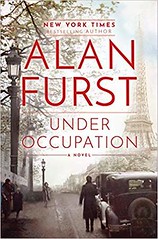“Yes, the secret commonwealth …you don’t hear much talk about that these days. When I was young, there wasn’t a single bush, not a single flower nor a stone, that didn’t have its own proper spirit. You had to have a mind to your manners around them, to ask for pardon, or for permission, or give thanks….Just to acknowledge that they were there, them spirits, and they had their proper rights to recognition and courtesy.”
—Philip Pullman, The Secret Commonwealth
 The Secret Commonwealth (The Book of Dust #2)
The Secret Commonwealth (The Book of Dust #2)
by Philip Pullman
![]()
I suppose every book in the “His Dark Materials” saga ends this way, but this one ends with a doozy of a cliffhanger. I’m literally panting to find out what Lyra discovers in the Blue City, and Philip Pullman hasn’t even announced what the title of the final novel will be! All I can do is wish him continued health and a long life, and hope for a swift resolution to the suspense.
Turns out the adult Lyra is as beguiling a character as she was as a young girl, but devoted readers will be upset by the estrangement between her and Pantalaimon. I was. The single most attractive element of Lyra’s world, at least to me, is the attachment between humans and their dæmons, and the separation of Lyra and Pan is what drives the tension and suspense of this novel. Well, that and the machinations of the Magisterium, of course.
Almost anything I say about the plot will be a spoiler for some. Some readers will no doubt want to stay in the world of the first three books, where Lyra is a young girl. I know some readers were left cold by the first novel in “The Book of Dust” series (I’ll start calling it a trilogy when the third novel is published), “La Belle Sauvage,” where Lyra, an infant, is a secondary character and a young boy, Malcolm Polstead, has the lead; they will have similar objections to “The Secret Commonwealth,” where Lyra is in her early 20s. Well, they’re a bunch of poopheads.
The element of fantasy, here expressed by the idea of the “secret commonwealth,” is present, mostly in the background but occasionally in the foreground, as is fantasy in the preceding novels, but overall the world of the adult Lyra is gritty and real, full of disturbing echoes or our own world and the horrific events unfolding around us: fleeing refugees from the Middle East and Africa, the rise of fascism in formerly democratic societies.
This novel, like the ones before it, was almost too rich to digest in one setting, and demands a second reading. After finishing the “La Belle Sauvage” I re-read the “His Dark Materials” trilogy, cover to cover. When I’ve read the third novel in “The Book of Dust” series, I will certainly give this trilogy a second reading.
I’ve only read one other series, book by book, cover to cover, more than once: the Aubrey/Maturin novels of Patrick O’Brian. When I say I’ve re-read one Philip Pullman trilogy … and plan to read his next trilogy more than once, even before the third book has been written, let alone read … you can take that as high praise.
 Case Histories (Jackson Brodie #1)
Case Histories (Jackson Brodie #1)
by Kate Atkinson
![]()
I was impressed with Kate Atkinson’s storytelling powers in her earlier novel, “Transcriptions.” My opinion of her writing remains high after reading “Case Histories.”
Jackson Brodie is an engaging character, a former soldier and policeman turned private investigator, still a young man at the height of his powers, most curiously retiring to France at the end of the first novel in a series. I think I can confidently predict he’ll have to come out of retirement, otherwise it won’t be much of a series!
I liked the concept here: Brodie being asked to look into unsolved crimes and murders committed from the 1970s to the 1990s, some of which he knew nothing about (having been a child at the time), some of which he remembers reading about in the papers. The survivors are alive, though, and one by one they become deeply involved with Jackson Brodie. Who gets close to solving the crimes, but as in “Transcriptions,” it is Kate Atkinson who wraps things up in a final chapter, introducing unsuspected twists. Good lord, we humans are awful awful creatures, and Ms. Atkinson … even more than Jackson Brodie … sees right through us.
Great, great fun. Fascinating characters, dry humor, plenty of action. I will certainly follow up on this series!
 The Testaments (The Handmaid’s Tale #2)
The Testaments (The Handmaid’s Tale #2)
by Margaret Atwood
![]()
I can’t help thinking “The Testaments” is part of a packaging effort meant to enhance (or extend, or exploit) the commercial success of HBO’s televised retelling of “The Handmaid’s Tale.” I don’t mean to crash down on it, because I truly enjoyed reading it, but I’m not sure it contributes anything of significance to the original work. “The Handmaid’s Tale” is canon and will be read and taught for generations to come; “The Testaments” will not, I suspect, achieve that status.
Well, Margaret Atwood is a damn fine writer, and there’s enough new information about Gilead (and a few of its main characters) in this second novel to keep anyone who fell under the spell of the earlier novel turning pages. This novel, more so than the original, has cliffhangers and perilous adventures (perhaps written with another TV series in mind?). It’s a solid read, but overall a lesser effort than the original.
In the final chapter, which consists of notes from yet another conference of Gileaden Studies academics held a century or more after Gilead’s fall and the reconstitution of the United States of America, we’re re-introduced to the scholar who spoke at the end of “The Handmaid’s Tale.” As in the first novel, he helps tie a few loose strings into a nice bow, but for some reason, this time around, he strikes me as a misogynistic asshole. I’m certain Margaret Atwood intended readers to have just that reaction. But why? To remind us that as long as we’re human another Gilead is always nearby? As the kids say, “ya think?”
 The Future of Another Timeline
The Future of Another Timeline
by Annalee Newitz
![]()
The science fiction in “The Future of Another Timeline” is fun but hard to swallow. Imagine a world where trained scholars from the future intermix with and study their forebears. Now imagine that it’s not done in secret: everybody, in all eras of history, knows people from the future walk among them, and accepts it. And then there’s this: scholars not only travel back to study the past … they “edit” it to improve the times they come from.
While Annalee Newitz touches on the potential consequences of altering the present by changing the past, she doesn’t get as deeply into it as I thought she might. Wouldn’t the urge to tinker with the past be irresistible? I can’t believe any society, no matter how educated and disciplined, would be able to restrict time travel to a small class of trained scholars. How would they stop the rest of us, to cite just one well-worn time travel trope, from going back in time to stay and live like kings by cashing in on our historical knowledge of sports scores and hot stocks?
But back to the novel: it’s amusing, as you get into the narratives provided by different travelers (and one young girl living less than happily in her own early-1990s present, certainly the grabbiest part of the novel), to see the ways the two “presents” Annalee Newitz focuses on (roughly the post-Reagan years and the early 2020s) already significantly differ from ours, and observe other momentous changes as travelers continue to muck about in the past.
Different timelines are not alternate universes, one traveler explains to another in a bit of expository dialog, nor can you jump to an alternate universe (as Julia Crane does in “The Man in the High Castle”). You can, though, alter history, then return to a different present (warning: you may not like the migraines that come with it). Okay. Got it. Wait. No I don’t get it. How are these not one and the same thing?
Possibly some spoilers here: the novel posits a near future where American women have only enjoyed the right to vote for a few years and Roe v. Wade never happened, their present far more impacted by Anthony Comstock and other crusading moralists of the late 19th and early 20th centuries than in our own reality. The tension in the novel comes courtesy of Comstock disciples from the future trying to alter the past to put women even more in their place, and a group of woman travelers determined to prevent them from doing so.
My own geeky science fiction quibbles aside, “The Future of Another Timeline” is an inventive and enjoyable science fiction novel with a strong feminist message.
 Blue Moon (Jack Reacher #24)
Blue Moon (Jack Reacher #24)
by Lee Child
![]()
I’ve read and reviewed every one of Lee Child’s Jack Reacher novels. Frankly, I’ve said all I have to say about them. If you’re addicted to the character, as I am, you will certainly want to read the latest, “Blue Moon,” number 24 in the series. As I just did.
“Blue Moon” is weaker than some novels in the series, stronger than others. I didn’t really get the feel of the unnamed midwestern city this one is set in … it was truly anonymous. The gangsters were notably weak, easily fooled, and ultimately ineffective. Jack had a far-too-easy time recruiting his own gang of accomplices, as much a deus ex machina as is artificial gravity in made-for-TV science fiction. Real people would have run from him and his unhinged plan to single-handedly defeat two separate armies of entrenched bad guys who had the cops on their payroll, and oh by the way where were those cops? Is this the first Jack Reacher novel where he doesn’t get busted and spend a night or two in jail?
Hey, it’s a Jack Reacher novel. You love Jack Reacher, you take the bad with the good, and no matter how bad these novels get, they’re still pretty goddamn good.
 Under Occupation (Night Soldiers #15)
Under Occupation (Night Soldiers #15)
by Alan Furst
![]()
From my earlier review of “A Hero of France” (Night Soldiers #14):
“The last three Night Soldiers novels read less like novels than outlines of novels, with characterization, world-building, and nuance yet to be added.”
I gave Alan Furst another chance, hoping he’d return to form in “Under Occupation,” the 15th novel in the Night Soldiers series, but no. In fact, this one strikes me as an ever lazier effort than the one before it. It’s a draft, unfleshed, lacking in feel and characterization. I could not believe in Ricard, nor Leila, nor Kasia, nor any of them. Ricard is reluctant to commit to the resistance, yet on the next page he’s all in, with nary a bit of inner struggle or dialog. Leila is an aristocrat with whom Ricard knows he hasn’t a chance; by the next page she’s dragged him into her bed. It’s like that throughout … the bare structure of a plot, waiting to be finished, contradictory twists suddenly introduced with no explanation.
Sorry, Mr. Furst. I loved your older novels but I do not even faintly like your recent ones. Good for you that fans continue to buy your books, but you’ve lost this one.
 Supernova Era
Supernova Era
by Liu Cixin
![]()
Did not finish; no rating.
I came to Liu Cixin’s science fiction through the excellent “Three-Body” trilogy, and later enjoyed an earlier novel titled “Ball Lightning.” The difference between the trilogy, hard theoretical SF on a cosmic scale, and the stand-alone “Ball Lightning,” near-contemporary military fiction with a slight SF premise, was stark, but I enjoyed Liu Cixin’s inventiveness, political and social perspectives, and writing.
Which brings me to Liu Cixin’s latest SF novel, “Supernova Era.” But wait … this isn’t his latest, not by a long shot. It’s an early work from 2003, only translated into English this year. As with “Ball Lightning,” originally written in Chinese in 2005, it’s being marketed to American fans as a new novel. To cash in on the author’s popularity with Western readers? I can’t say.
The difference between this novel and ones that made me a Liu Cixin fan needs an adjective stronger than stark.
This time I did not enjoy the writing, not at all. The story is based on a ludicrous premise, with not even a remotely-plausible “scientific” explanation, just some empty hocus-pocus. The characters are cardboard cutouts, and halfway through … once the world’s entire adult population dies en masse … the storyline devolves into one I could neither relate to or buy. That is the point at which I gave it up as a bad job.
The next time they announce a new novel by Liu Cixin, you’d better believe I’ll do some research before buying it, to make sure it really is new.